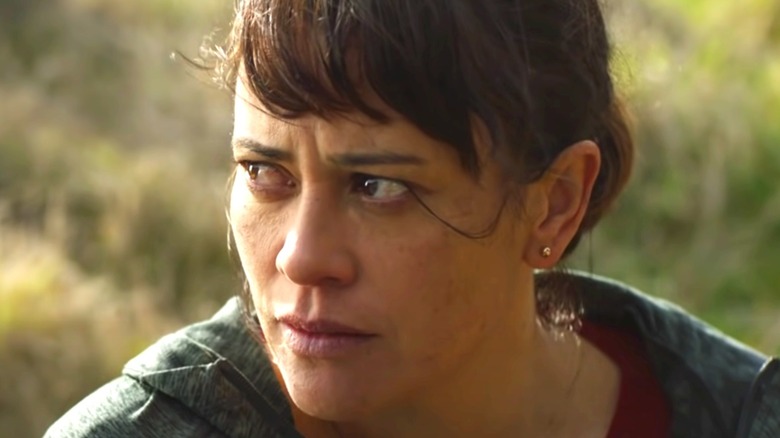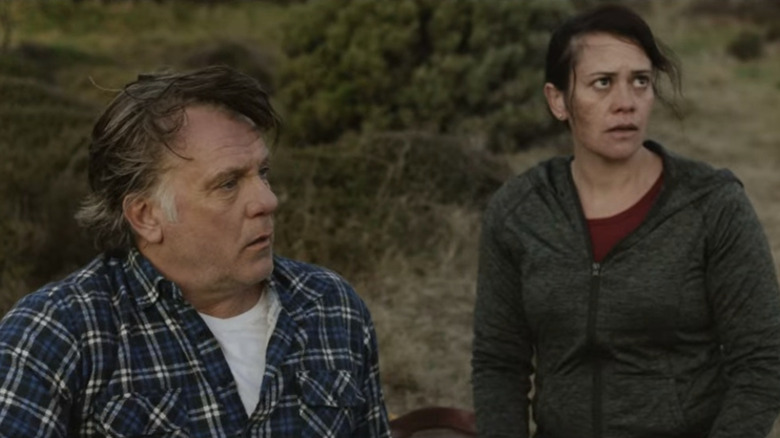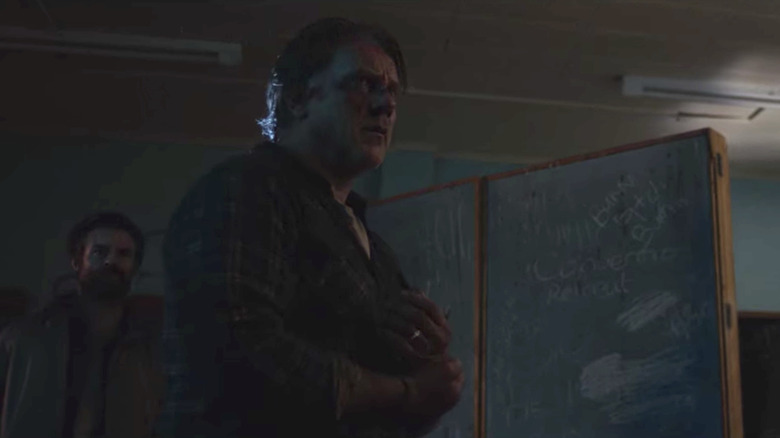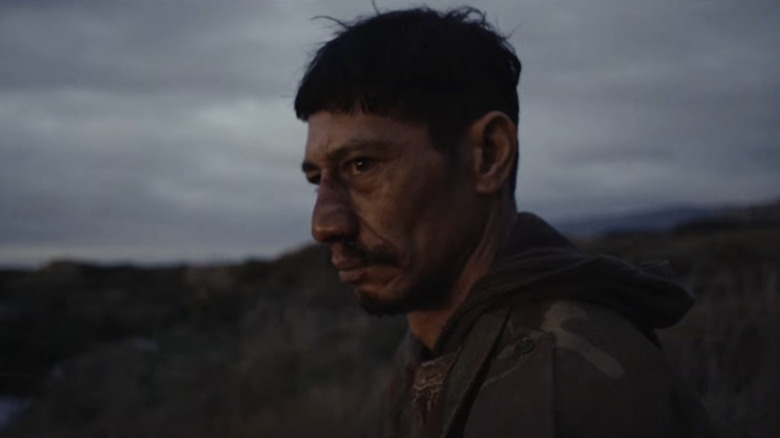The Ending Of Coming Home In The Dark Explained
The following article includes mentions of child abuse and sexual assault.
Based on a short story of the same name by Owen Marshall, the New Zealand psychological thriller, "Coming Home in the Dark," was directed by James Ashcroft, who co-wrote the film's screenplay with Eli Kent. It originally premiered at the Sundance Film Festival in January (via /Film) and is now available to watch on Netflix.
The film centers on a family road trip that quickly turns deadly and frightening for Alan (Erik Thomson) and his wife, Jill (Miriama McDowell), as well as their two sons, Jordan (Frankie Paratene) and Maika (Billy Paratene). While the family of four is having a peaceful picnic by the waterfront, they're suddenly approached by two somber, eerie-looking men named Mandrake (Daniel Gillies of "The Vampire Diaries" fame) and Tubs (Matthias Luafutu). Mandrake reveals that he has a rifle, and the family quickly realizes that they're in danger. Alan, meanwhile, is left unsettled and confused after Mandrake calls him "Hoagie," which turns out to be an old nickname of his.
Within minutes, Mandrake has shockingly shot and killed both of Alan and Jill's sons. Afterward, Alan and Jill are forced back into their car, and Mandrake's motives gradually start to become clear. It is revealed that Mandrake was abused as a kid by teachers at his boys' school and Alan, an assistant teacher there at the time, may have been involved. Both Alan and Jill insist that Alan was not one of the abusers, but Mandrake's sadistic behavior toward them — particularly Alan — suggests not only that there may be more to the story, but that their meeting may be much less random than it initially seemed.
If you or someone you know may be the victim of child abuse, please contact the Childhelp National Child Abuse Hotline at 1-800-4-A-Child (1-800-422-4453) or contact their live chat services.
The price of doing nothing
After a failed escape attempt results in the needless death of a gas station attendant, Mandrake forces Alan and Jill to kneel at the side of the roadand demands to know what Alan did while he was a teacher at Mandrake's former school. Alan despairingly admits that he witnessed a lot of the abuse that was going on at the school when he was there, including instances of whipping and sexual assault.
When Mandrake pushes for more information, Alan reveals that there was one specific incident he witnessed up close. He explains that all of the school's boys used to line up on the playground's four-square court for roll call, a procedure that was referred to as "on-line." As an assistant teacher, Alan wasn't typically involved with the process but had to help conduct it one time when the school was understaffed.
The day Alan helped out, one of the school's teachers saw that a little boy had given himself a tattoo of a swastika and demanded that someone get them a wire brush. With the brush, the teacher began scrubbing the boy's tattoo while he screamed and cried in pain. Alan, however, merely stood by and watched. Mandrake reveals himself to be the boy in question when he corrects Alan that it was not a wire brush, but a nylon brush that the teacher had used to scrub away his tattoo.
It subsequently becomes clear that Mandrake sees no difference between committing an awful act and standing by while one happens. Therefore, the torture that he has put Alan and Jill through, as well as the murder of their kids, are intended to be the consequences of Alan's failure to intervene when Mandrake was being abused.
If you or anyone you know has been a victim of sexual assault, help is available. Visit the Rape, Abuse & Incest National Network website or contact RAINN's National Helpline at 1-800-656-HOPE (4673).
Everything ends on-line
Not long after Alan's confession, Jill throws herself off the side of a cliff and into the water below (it's unclear whether or not she died), leaving Alan alone to face the consequences of his past failures. Mandrake takes Alan and Tubs back to the school where it all began, which is now abandoned. Once there, Alan admits that he acted like a coward when Mandrake was being abused, but also says that he thought the young boy deserved it.
Mandrake demands Alan that stand "on-line," and when he does, Mandrake shoots Alan with his rifle. The bullet grazes the side of Alan's stomach, but while he is on the ground, he manages to grab a rock and nearly beats Mandrake to death with it. Choosing not to grab the rifle, Alan begins to crawl away while Mandrake attempts to shoot him again.
Tubs, however, walks over to the two wounded men, picks up the rifle, and shoots Mandrake right in the head — killing him instantly. He then walks over to Alan, but instead of killing him, merely says, "I hate this place," before walking away.
Alan's fate is, much like his wife's, left ambiguous. However, considering the severity of his gunshot wound and the fact that he has no phone to call for help with, it seems safe to assume that he bleeds out and dies off-screen. Either way, what the film does make clear is the fact that, ultimately, Alan was unable to escape the consequences of his decision years prior.
Why does Tubs kill Mandrake?
While Tubs spends much of "Coming Home in the Dark" acting as Mandrake's mostly silent, obedient right-hand man, he ends up being the only character in the film that we absolutely know makes it out alive. It is implied early in the movie that Tubs was also a student at the boys' school where Mandrake was abused, and he later confirms that fact when he tells Alan that he "hates this place" right after killing Mandrake. Given their shared history together, it's undeniably surprising that Tubs is the one to kill Mandrake instead of Alan, and it leaves viewers with something interesting to think about.
Essentially, there are two reasons why Tubs may have chosen to kill Mandrake, someone who had experienced the same trauma and abuse he likely did. Firstly, it's possible that Tubs may secretly have resented Mandrake for making him relive his past experiences by seeking out the teachers who hurt them. After all, we can safely assume that Alan was not the only former faculty member that the pair sought out.
Alternatively, Tubs may have taken Mandrake's own philosophy more seriously than his partner realized. In other words, Tubs may decide in the film's final act that, by simply letting Mandrake torment Alan and his family, he was doing exactly what Alan had done all those years ago: letting violence occur without stepping in.
But no matter what Tubs' reasons are for killing Mandrake, his final decisions in "Coming Home in the Dark" add an interesting wrinkle to the film's thematic questions about which actions — or inactions — may warrant punishment, and which don't. Those themes and questions will probably linger in viewers' minds long after they finish the film, as will its closing shot of a teary-eyed Tubs looking out over the water, likely thinking about the fact that, over the course of just one night, he played a role in the deaths of several people.



